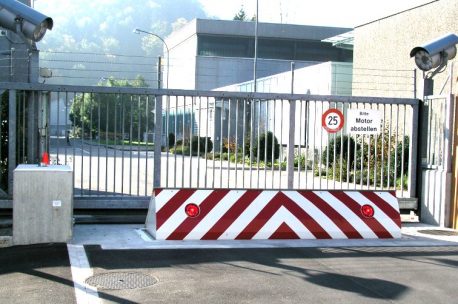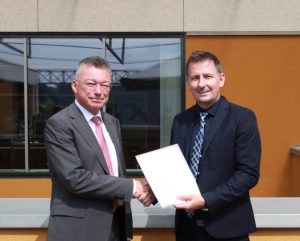International experts provide Switzerland with recommendations for further improving security
The nuclear security regime is well established in Switzerland. That was the finding of an IPPAS team of experts of the International Atomic Energy Authority (IAEA) at the conclusion of their two-week mission. The team identified 13 good practices, 9 recommendations and 37 suggestions.
 The mission of the International Physical Protection Advisory Service IPPAS was to audit the national nuclear security regime, the security of nuclear installations, security during transport of nuclear products and the cyber security of nuclear installations.
The mission of the International Physical Protection Advisory Service IPPAS was to audit the national nuclear security regime, the security of nuclear installations, security during transport of nuclear products and the cyber security of nuclear installations.
“The basic aim of nuclear safety and security is to protect man and the environment against the harmful effects of ionising radiation. Switzerland supports international peer reviews as an effective means of continuous improvement”, states Hans Wanner, Director of the Swiss Federal Nuclear Safety Inspectorate (ENSI). “We value the exchange of experience with the team of experts and will analyse and implement its recommendations.”
Safety and security of nuclear installations
The basic protection aims of nuclear safety are controlling reactivity, cooling the fuel elements, the containment of radioactive substances and, of overriding importance, the limitation of radiation exposure. Security relates to the protection of a nuclear installation against unauthorised impacts such as sabotage or terrorism. In addition, security measures also prevent the stealing of nuclear materials. Both security and safety relate to technical, structural, organisational, administrative and personnel measures.
Clear guidelines for cyber security
Amongst other things, the IPPAS mission recommends that ENSI expands its regulatory cyber security requirements for nuclear installations. The corresponding guidelines should be effective, measurable and matched to the threat.
Rosa Sardella, Director of the Radiation Protection Division and also responsible for security matters states, “For us Cyber Security is a central theme.” “The exchange with international experts on this subject and their recommendations are helpful for our ongoing work in this area.” The ENSI Board defined security and explicitly Cyber Security as a strategic focus in its Performance Mandate 2016-2019.
Further recommendations relate, amongst other things, to the development of a process for determining the prohibited radiological consequences of an act of sabotage, the interfaces between nuclear security and safeguards, plus the use of the Design Basis Threat for the definition of realistic sabotage scenarios.
Sound principle of continuous upgrading

Switzerland was praised because the principle of continuous upgrading is enshrined in legislation. This contributes to the continual reinforcement of the individual elements of the safety and security regime throughout the entire operating period.
The POLYCOM radio system was also assessed as a good practice. This ensures that all national security organisations such as police, fire brigade and army communicate with each other via an encrypted system so that deployments are well coordinated.
Eight-member team with Finnish leadership
The team, lead by Tapani Hack, Section Head of Nuclear Security with the Radiation and Nuclear Safety Authority of Finland, comprised seven other experts from the Czech Republic, Hungary, Germany, the Netherlands, the United Kingdom, the United States and the IAEA.
The team met in Brugg and Bern with members of ENSI, the Swiss Federal Office of Energy SFOE, the Federal Department of the Environment, Transport, Energy and Communications, DETEC, the Federal Department of Foreign Affairs FDFA, the Reporting and Analysis Centre for Information Assurance MELANI, Federal Office of Police fedpol and the Federal Intelligence Service FIS. Talks also took place with representatives of the Federal Office for Civil Protection FOCP, the cantonal police and the Central Interim Storage Facility ZWILAG. Additionally, the team also visited three of the four Swiss Nuclear Power Plants to obtain its own view of the implementation of security measures.
The IPPAS Mission
While IRRS missions relate to nuclear safety, IPPAS missions are concerned with nuclear security. Missions of the International Physical Protection Advisory Service IPPAS are an advisory and support service of the IAEA. Within them, experienced foreign experts provide an external perspective of the legal and regulatory framework conditions in Switzerland. ENSI is legally obliged to undergo such checks by the IAEA.
The 2018 mission in Switzerland was the 84th IPPAS-Mission of the IAEA since the start of the programme in 1995. The last IPPAS mission in Switzerland took place in 2005.

